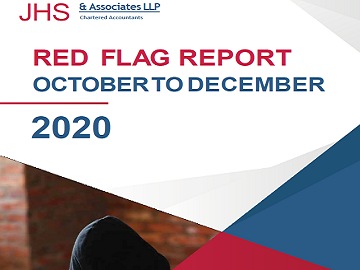By Huzeifa Unwala, Sr. Partner, JHS & Associates LLP
MCA vide order dated 17.12.2020 has changed the applicability date of Companies (Auditor’s Report) Order, 2020 to the financial years commencing on or after the 1st April 2021. Therefore, Companies (Auditor\’s Report) Order, 2020 (CARO 2020) will be applicable from FY 2021-22. CARO 2016 continues to be applicable for Financial Year 2020-21. The revised CARO 2020 effective from 1.4.2021 aims to increase transparency and quality of reporting, Central Government in consultation with the National Financial Reporting Authority (NFRA) has issuedCompanies (Auditor’s Report) Order, 2020 on 25th February 2020. This new order replaces the earlier order under Companies (Auditor’s Report) Order, 2016.
CARO 2020 is a revised audit statement format for issuance of audit reports on specific questions under para 3 and 4 of the order, in case of audit of companies under Companies Act, 2013. This order applies to Companies that meet the following conditions:
| Turnover/ Gross Receipts | Paid-up share capital plus reserves | Borrowings |
| Rs. 10 Crores or above during the FY | Rs. 1 Crore or above during the FY at end of the FY | Rs. 1 Crore or above during the FY |
CARO 2020 excludes certain category of companies such as One-Person Company, Small Company, Banking and Insurance Companies. The revised CARO has added 22 new reporting requirements that have further increased the maze of compliances that Corporates have to achieve for each financial year. Category wise movement matrix is provided hereunder:
Top 10 highlights where the Ministry of Corporate Affairs has aimed to plug existing loopholes in corporate reporting are:
- Intangible Assets: – Full particulars of Intangible Assets would require disclosure. Corporates regularly capitalize R & expenditure, new product development expenditure, ERP investments, trademarks, etc. Earlier provisions were only focused on Tangible Assets.
- Benami Transactions: – Whether any proceedings have been initiated or are pending against the company for holding any benami property under the Benami Transactions (Prohibition) Act, 1988 (and rules made thereunder, if so, whether the company has appropriately disclosed the details in its financial statements.
- Agreement of Quarterly Bank Submissions with Books of Accounts: – Whether during any point of time of the year, the company has been sanctioned working capital limits in excess of five crore rupees, in aggregate, from banks or financial institutions on the basis of security of current assets; whether the quarterly returns or statements filed by the company with such banks or financial institutions are in agreement with the books of account of the Company, if not, give details;
- Evergreening of existing loans: – Whether any loan or advance in the nature of loan granted which has fallen due during the year, has been renewed or extended or fresh loans granted to settle the overdues of existing loans given to the same parties, if so, specify the aggregate amount of such dues renewed or extended or settled by fresh loans and the percentage of the aggregate to the total loans or advances in the nature of loans granted during the year [not applicable to companies whose principal business is to give loans];
- Unaccounted Income: – Whether any transactions not recorded in the books of account have been surrendered or disclosed as income during the year in the tax assessments under the Income Tax Act, 1961, if so, whether the previously unrecorded income has been properly recorded in the books of account during the year;
- Willful defaulter status: – Whether the company is a declared willful defaulter by any bank or financial institution or other lenders.
- Solvency:– On the basis of the financial ratios, ageing and expected dates of realization of financial assets and payment of financial liabilities, other information accompanying the financial statements, the auditor’s knowledge of the Board of Directors and management plans, whether the auditor is of the opinion that no material uncertainty exists as on the date of the audit report that company is capable of meeting its liabilities existing at the date of balance sheet as and when they fall due within a period of one year from the balance sheet date;
- Auditor Qualifications: – Whether there have been any qualifications or adverse remarks by the respective auditors in the Companies (Auditor’s Report) Order (CARO) reports of the companies included in the consolidated financial statements, if yes, indicate the details of the companies and the paragraph numbers of the CARO report containing the qualifications or adverse remarks.
- Physical Verification of Inventory: – Whether physical verification of inventory has been conducted at reasonable intervals by the management and whether, in the opinion of the auditor, the coverage and procedure of such verification by the management is appropriate; whether any discrepancies of 10% or more in the aggregate for each class of inventory were noticed and if so, whether they have been properly dealt with in the books of account;
- Fraud Reporting/ Whistle Blower Complaints: – Whether the auditor has considered whistle-blower complaints, if any, received during the year by the company.
Conclusions & Impact
While the revised CARO 2020 will go a long way in enhancing the stated objectives, however, it may become difficult for management to maintain compliance from 1st April 2021 in terms of the onerous record keeping and re-designing of internal controls over the specific additional aspects introduced in the revised CARO. Further, the auditor is required to give reasons for any unfavourable or qualified answers to the specific questions stated in the CARO 2020 order; FY 2021-22 being the first year auditors would be required to do sufficient advanced planning and perhaps an interim review of client preparedness may be very useful in meeting the CARO 2020 compliance requirements.
Considering the wider import of CARO 2020, FY 2021-22 would usher in a change in the Control environment, Internal Control Policies & Systems, Internal Audit Scope, ICOFR scope and most certainly Auditor’s checklist.












